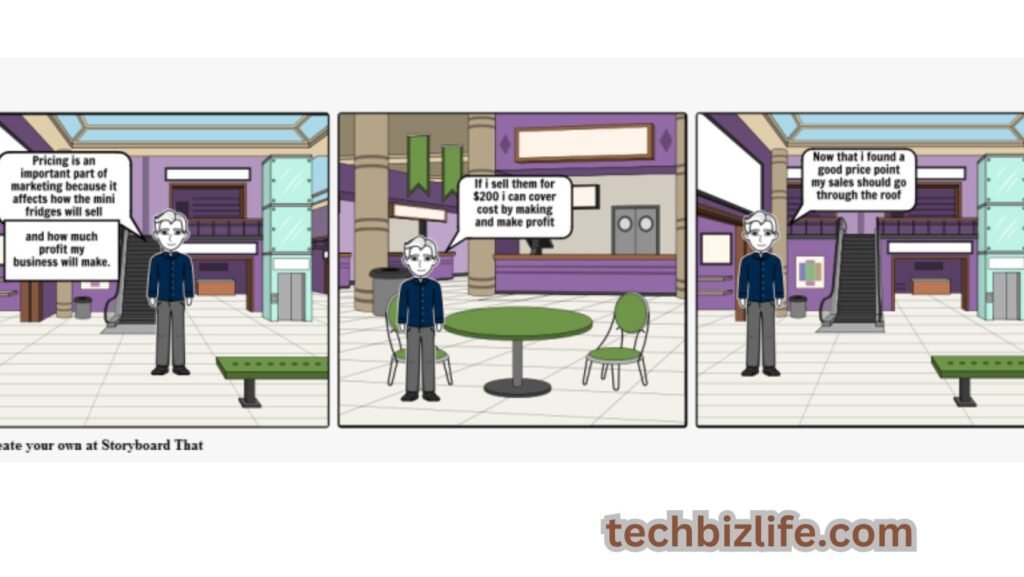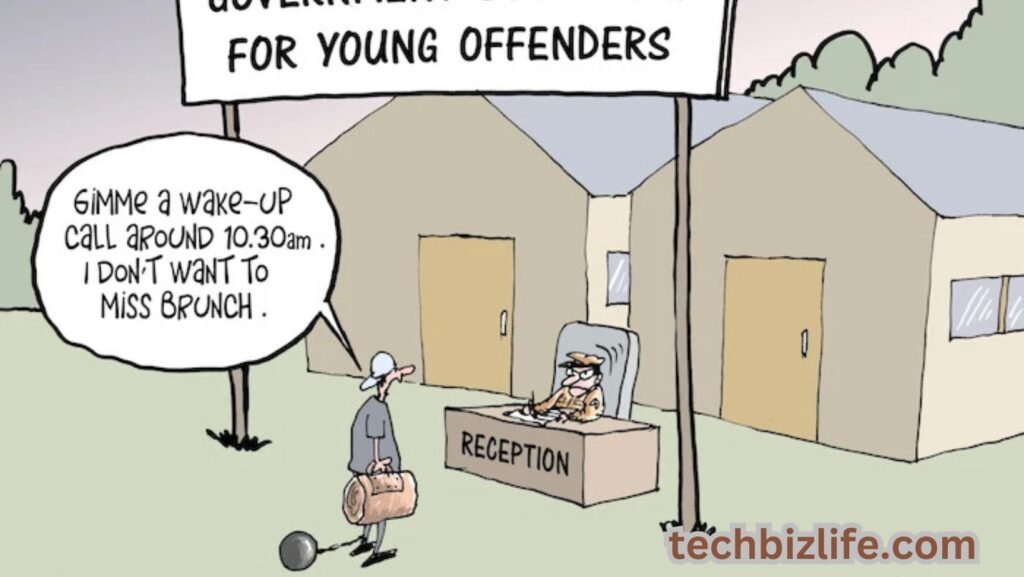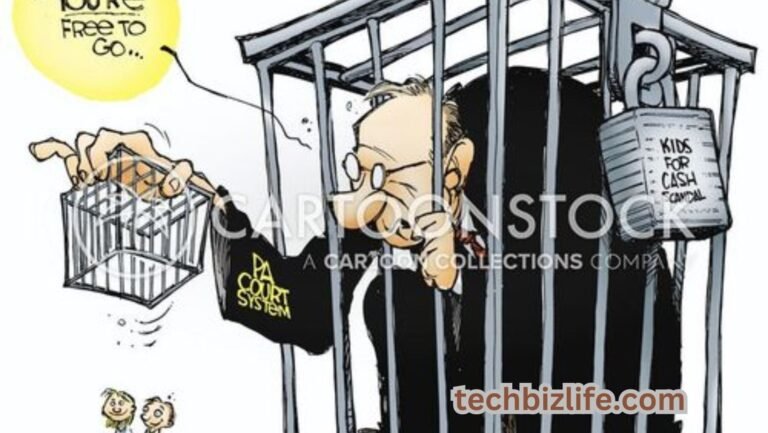For instance, political cartoons from YCJA provided a visual critique of the Youth Criminal Justice Act in Canada. They reflected public views and policy debates over youth justice reform. Such cartoons focus on some significant concerns of young offenders, rehabilitation, and social consequences and initiate discourses over whether the YCJA balances justice with rehabilitation. This article argues on how the political cartoons of YCJA illustrate key themes of the act, analyzes their role in affecting public opinion, and highlights their importance for civic education in Canada
What Are YCJA Political Cartoons?
YCJA political cartoons are an illustration of an editorial nature, which mocks and lampoons the Youth Criminal Justice Act (YCJA). Typically, these cartoons use satire, irony, and visual metaphors in expressing judgments about the way Canada has embarked on youth justice, and arguments raised against it regarding leniency, effectivity, and purposes.
Also, Read More: ycja political cartoons
Political Cartoons in the Canadian Youth Justice Discourse
Political cartoons are useful for criticizing and commenting on Canadian policies. In a meeting with the Association of Canadian Editorial Cartoonists, visual satire is highlighted to reach the masses on matters that are relatively simple by using exciting imagery and commentaries.

Social and Political Influence
| Survey Insights | Percentage |
|---|---|
| Canadians influenced by cartoons | 65% |
| Youth justice considered important | 58% |
Scientific studies show that cartoons can determine public opinion. The Ipsos survey conducted in 2022 reveals that 65% of Canadians reported that editorial cartoons influence their views about current issues, including justice and crime policies. Relating to have shown a general public perception of youth justice.
Learning
YCJA cartoons are learning aids at schools, promoting the ideas of students regarding the law, justice, and rehabilitation.
Top Themes on YCJA Political Cartoons
Political cartoons on the YCJA are generally top-heavy, reflecting key issues of the day and societal debates about youth justice in Canada.

Rehabilitation or Punishment
A primary theme of the YCJA cartoons takes the form of rehabilitation versus punishment. This theme is reflective of public debates on whether young offenders should be rehabilitated or provided with punitive measures, especially for those offenses not violent.
Weakness or Accountability
Critics see the YCJA as too lenient, and it is often targeted as part of the rhetoric “soft on crime”. Cartoons in this direction highlight perceived lacunas in responsibility and the overall propensity for the system to give offenders a second-chance-sometimes third, fourth, or fifth.
Data Insight
Statistics Canada Survey, 2021:
42% of respondents thought YCJA was lenient. 36% believed it to be balanced between leniency and accountability.
How YCJA Political Cartoons Influence Public Opinion
YCJA political cartoons amplify certain perspectives that affect how the public views youth justice.
Simplifying Complex Issues
Make complex policies easier to understand, thus making them easier to grasp for the average person. Cartoons may translate complex legal information into understandable images, which will eventually influence opinions on youth justice.
Satire as a Call to Action
Satirical illustrations of the YCJA may also drive policy changes. Cartoons illustrating lenience and loopholes in the YCJA may later influence public opinion even more to accommodate further reforms.
Sample YCJA Political Cartoons
Leniency in Youth Sentencing
Some cartoons show the lenient youth sentencing process with illustrations of “getting off easy,” oftentimes, being “comic release” with judges showing too much leniency or even indifference to the consequences of the crime.
Rehabilitation as a Priority
Rehabilitation cartoons generally show juvenile offenders in school, counseling, and other services to reveal the constructive approach and not the punitive approach.
Public Perception of YCJA and Political Cartoons

Public Perception Divided into Two Ends
The general public of Canada remains evenly divided over the YCJA. According to a 2022 survey by the Canadian Polling Association, while 52% of the respondents complained that the policies of crime against youngsters under the YCJA were too soft, as many as 48% supported the rehabilitation-oriented approach of the act.
Age-based differences in opinion
In fact, research conducted in the Canadian Justice Department has found that young Canadians hold a higher opinion of the rehabilitative aspects of the YCJA, whereas the older sections are inclined toward strict measures.
Education Benefits of YCJA Political Cartoons
YCJA political cartoons are also used in classrooms and youth programs to promote discussions on youth justice and legal policies.
Teaching Critical Thinking
The teachers use these cartoons since they aid in educating critical thinking skills and encourage the students to set their own opinion on different aspects of youth justice.
The Future of YCJA Political Cartoons
Where the debates on youth justice are concerned, drawn under the will continue to feature as an interactive, educative tool for public affairs communication in Canada. They channel mindsets and policy changes regarding youth justice, thus appropriately educating and engaging society.
FAQs

What is the Purpose of YCJA Political Cartoons?
This yardstick of measure shall criticize and comment on the Youth Criminal Justice Act in its role in deciding the changed Canadian society.
Are YCJA Cartoons That Influence Policy?
Though they cannot, per se, change policy themselves, cartoons are able to influence public opinion by pointing out the places that require change in policy.
Why Are YCJA Cartoons Important for Education?
YCJA cartoons enable students to learn more about issues of youth justice better by simplifying difficult subjects and encouraging thought.
What Common Themes Are There in Political Cartoons of YCJA?
Common themes here are leniency, rehabilitation vs. punishment, accountability, and effectiveness of the act.
Do YCJA Political Cartoons Influence Public Opinion?
Yes, by simplification and illustration, cartoons can make otherwise difficult issues easier for people to form opinions on regarding youth justice policies.
How Do YCJA Cartoons Approach Rehabilitation and Punishment?
Comics illustrate the tension in drawing youth offenders as second-chance takers or people who evade accountability.
Also, Read More: ycja political cartoons
Conclusion
Political cartoons on the YCJA provide insight into the perception of youth justice by society in Canada. By combining satire with more serious commentary, these cartoons explore complex issues like leniency, rehabilitation, and accountability, thus shaping Canadians’ depths of consideration of and critique of youth justice policies. The same being educational tools and media on their own, YCJA political cartoons provide an invaluable ground for reflection on the effect of the Youth Criminal Justice Act, for stimulating debates, and perhaps inspiring future reforms. Whether one is a proponent of a more “restrictive” policy or someone supporting the purposes for which the act aims to rehabilitate, these comics make discussion about youth justice accessible, thought-provoking, and engaging.


